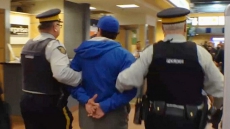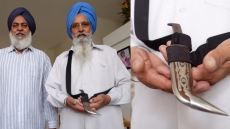VANCOUVER — Byrdie Funk had what some would call a quintessential, small-town Canadian upbringing.
At two months old she moved from Mexico with her Canadian parents to a farming community in southern Manitoba. She learned to skate on a backyard pond and trudged between snowdrifts to school, where she would stand with fellow students to sing the national anthem before class.
She used her Canadian passport to travel to South Africa, toting a suitcase sporting the maple leaf, and was later married at a historic trading post on the banks of Winnipeg's Red River.
But earlier this year the 36-year-old woman's life was upended when she received a letter from Citizenship and Immigration Canada informing her she was no longer a Canadian citizen.
"It took my breath away," Funk said in an interview from her home in Squamish, B.C.
"I had no idea that anything like this could even happen."

She is one of an unknown number of people ensnared in an arcane law that automatically revokes the citizenship of certain Canadians who fail to officially apply to retain their nationality before the age of 28.
The little-known policy applies to anyone born abroad between Feb. 15, 1977, and April 16, 1981, to Canadian parents who were also born outside the country.
The rule was abolished by the Conservative government in 2009, but the change wasn't retroactive, so it didn't include anyone who had already turned 28 by then.
Funk said she only learned about the law this spring after trying to renew her passport.
The law was drafted in the 1970s out of concern that citizenship could be passed along indefinitely to generations abroad who were less and less connected to Canada, said Audrey Macklin, a law professor at the University of Toronto.
Macklin said it wasn't necessarily unfair, at least in theory, to require someone twice removed from being born in Canada to prove a connection to the country.

The problem, though, was rooted in the government's inability to identify and inform those people that their citizenship would "evaporate" if they didn't take specific steps to retain it, she said.
Lindsay Wemp, a spokeswoman with Citizenship and Immigration Canada, said in an email that the immigration minister can offer discretionary citizenship in extraordinary circumstances on a case-by-case basis.
Funk said she contacted Minister John McCallum's office in July and has yet to receive a response.
Donald Galloway, a University of Victoria law professor, said he didn't think the government has taken the necessary steps to let people know "the narrow hinge" their status was hanging on.
"I think it's quite shocking to live in a country where the government creates these byzantine rules and says 'Well, it's up to you to know the details,'" he said.
Funk isn't alone. Eva Friesen of Steinbach, Man., became stateless after losing her citizenship at the age of 28. She had to officially immigrate to Canada after living as a Canadian since she was six.
The now-37-year-old woman heard about the rule by word of mouth when she was 27, but she said that didn't give her enough time to arrange the necessary paperwork before the deadline.

"I think that's totally unfair, especially if you grew up here and you know nothing else," she said.
Another unrelated Manitoba resident, Monica Friesen, discovered at 30 that she had let her citizenship lapse decades after arriving to Canada.
"I don't understand how the government can't inform people," she said. "I hope (my story) opens up the eyes of the government that maybe something should be done."
She eventually received a discretionary grant.
Galloway estimates there are hundreds affected by the law, many of whom are likely unaware. An Immigration Canada spokeswoman said the exact figure is unknown, but small.
The policy is another chapter in the story of the "lost Canadians," made up of residents whose citizenship was either revoked or never granted in the first place due to kinks in Canada's laws.
Over the years, the government has legislated corrections for the oversights, normally by retroactively offering citizenship to affected groups, from war brides to the children of soldiers born overseas. But recourse was never offered to those affected by the 28-year rule.
Don Chapman, the self-styled leader of the lost Canadians, has been lobbying on behalf of these groups for years.
"The laws are a dog's breakfast," Chapman said in an email, adding that Canada's reputation as being fair and compassionate is not always deserved.

While not caught by the 28-year rule, Jim McLellan of Wolfville, N.S., has experienced firsthand the sometimes tragic fallout of Canada's idiosyncratic citizenship laws.
McLellan was born in the United States in 1945 to a Canadian mother and an American father. Prior to 1947, Canadian law denied citizenship to any child born abroad to a Canadian woman who was married to a foreigner.
He said he entered Canada in 2005 to care for his ailing mother and didn't visit a hospital about his own deteriorating health in order to avoid the risk of deportation.
Legal changes in 2015 paved the long road to citizenship, after which McLellan learned he had terminal lung cancer, which had metastisized to his brain. Eight months ago, he was given four months to live.
"I'll be dead in a few weeks," McLellan said in a recent interview, his voice slurring slightly. "I had to live all of that time without health care."
McLellan said he hopes his story inspires Prime Minister Justin Trudeau to make good on his word that "A Canadian is a Canadian is a Canadian."
"We're ready to shout it from the rooftops," McLellan said.
A LOOK AT THE COMPLEX EVOLUTION OF CANADA'S CITIZENSHIP LAWS OVER THE YEARS

A British Columbia woman is speaking out after discovering she's been ensnared by an obscure law that automatically revokes the citizenship of second-generation Canadians that were born abroad. Legal experts say the law is unfair and agree that the country's citizenship laws are convoluted.
Here is a timeline of the most significant milestones in the snakes and ladders of Canada's citizenship legislation over the decades:
Naturalization Act (May 22, 1868): Prior to 1947, anyone born in Canada was technically considered a British subject.
Canadian Citizenship Act (Jan. 1, 1947): Canadian citizenship is legally created, along with special recognition for British subjects. Requirements are introduced for anyone born outside the country to a Canadian parent in order for them to retain their citizenship.
Citizenship Act (Feb. 15, 1977): Dual citizenship is recognized and British subjects lose special status. The act also introduces the 28-year rule, requiring that Canadians born abroad to Canadian parents who themselves were born abroad take special measures to retain their citizenship before the age of 28.
Bill C-14 (Dec. 23, 2007): Children born outside the country to Canadian parents, as well as adopted children, are allowed to bypass permanent resident status and become Canadian citizens directly.

Bill C-37 (April 17, 2009): The law offers retroactive citizenship to many of the so-called lost Canadians who had been either denied or never offered citizenship because of quirks in earlier legislation, including war brides and children born to soldiers or bureaucrats posted abroad. It also does away with the 1977 rule requiring second-generation Canadians born abroad to apply to retain their citizenship by the age of 28.
Bill C-24: Strengthening Canadian Citizenship Act (June 11, 2015): The act automatically extends citizenship to other lost Canadian groups born prior to 1947 who were excluded in the previous legislative changes, as well as to any of their children born outside Canada. It also empowers the government to revoke the Canadian citizenship from dual citizens convicted of serious offences, including terrorism.

Bill C-6 (Currently before parliament): The bill proposes to loosen requirements on immigration, including language requirements and how time spent living in Canada is counted. It also reverses Bill C-24's provision for removing citizenship in cases such as terrorism convictions against dual citizens.





